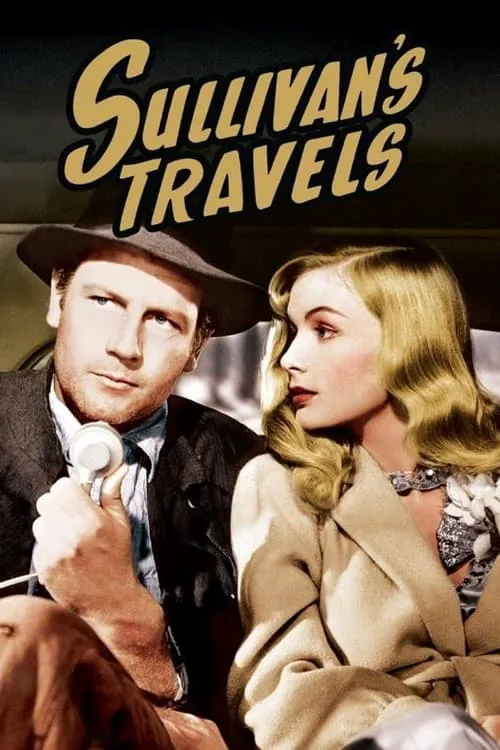Sullivan's Travels

Plot
In the film Sullivan's Travels, directed by Preston Sturges and released in 1941, a tale of transformation and self-discovery unfolds as John L. Sullivan, a successful film director played by Joel McCrea, sets out to immerse himself in the hardships of the common man. Convinced that the only way to authentically capture the struggles of the underprivileged in his forthcoming masterpiece is to experience them firsthand, Sullivan dons a hobo disguise and embarks on a journey across the country, with the intention of getting acquainted with trouble. Upon boarding a train headed west, Sullivan meets a beautiful blonde woman named Veronica at a diner. The two strike up a conversation, and despite initial reservations, Sullivan finds himself developing feelings for the charming Veronica. However, as the train ride comes to an end, Sullivan realizes that his sojourn has fallen far short of the hardships he had envisioned. His hobo experience, it turns out, consists of nothing more than the occasional meal and the company of a beautiful woman – hardly the deprivation he had anticipated. This revelation prompts Sullivan to redouble his efforts, and with newfound determination, he sets out to delve deeper into the world of the underclass. Undeterred by his initial shortcomings, Sullivan ventures further into the depths of American society, encountering individuals from various walks of life. He becomes enamored with the experiences of the people he meets and begins to genuinely understand the struggles they face. Nevertheless, Sullivan's persistence often lands him in trouble, as evidenced by his ill-fated encounter with a group of chain gang inmates. The turning point in Sullivan's journey comes when he loses his memory in a fight, finds himself a prisoner on a chain gang in Mississippi, and is forced to confront the harsh realities of life under such circumstances. This experience marks a profound shift in Sullivan's perception, as he begins to comprehend the true meaning of hardship and deprivation. The once-carefree and affluent director is confronted with the brutal realities of life as a common man and is forced to confront the limits of his own endurance. As he navigates the unforgiving environment of the chain gang, Sullivan starts to grasp the depth of his ignorance about the hardships faced by ordinary Americans. His earlier attempts to experience hardship are now revealed to be feeble and misguided, driven more by a desire for authenticity in his filmmaking than genuine empathy. This harsh self-realization forces Sullivan to re-evaluate his artistic vision and confront the shallowness of his earlier endeavors. Throughout his ordeal, Sullivan's interactions with the chain gang members humanize an otherwise bleak environment. He forms an unlikely bond with a fellow inmate, the gruff but affable Joe, played by Robert Hutton, who takes a paternal interest in the director's well-being. This camaraderie serves as a counterpoint to the harsh realities of life on the chain gang, adding a layer of humanity to an otherwise desolate landscape. Ultimately, Sullivan's Travels offers a commentary on the superficiality of Hollywood's fascination with reality, as embodied by the protagonist's initial quest for authenticity. The film masterfully subverts the expectations set by Sullivan's ambitions, instead offering a nuanced exploration of the complexities of human experience. Through Sullivan's journey, Preston Sturges critiques the Hollywood establishment's tendency to romanticize hardship, instead suggesting that real understanding and empathy can only be achieved through a deeper engagement with the struggles of others.
Reviews
Recommendations




